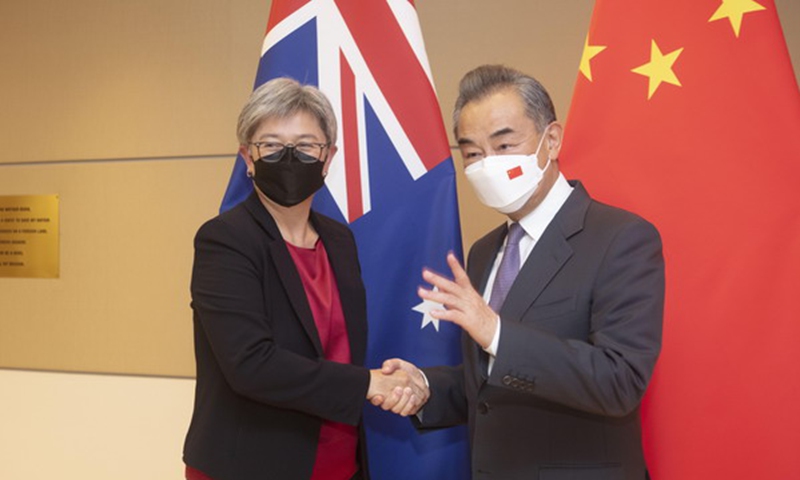
Photo: fmprc.gov.cn
Chinese State Councilor and Foreign Minister Wang Yi talked with Australian Foreign Minister Penny Wong on Thursday on the sidelines of the UN General Assembly in New York, in a meeting which Wong described as "constructive."
The second meeting between the two diplomats in three months signals Beijing-Canberra ties have warmed up slightly with the new Australian government under Prime Minister Anthony Albanese. But some analysts said that Australia needs to make more concrete and substantive efforts in fixing ties with its largest trade partner, as its alliance with the US is hard to ignore.
Wang said during their last meeting in Bali, they stressed the importance of China-Australia relations, reaffirmed the position of comprehensive strategic partnership between the two countries, and agreed to put bilateral relations back on track at an early date based on mutual respect.
"A constructive conversation with China's Foreign Minister Wang Yi tonight… The meeting reaffirmed the Australian Government's view that it is in the interests of both sides to continue on the path of stabilizing the relationship," Wong said in a post-meeting Twitter post on Friday. In a picture, Wong is seen shaking hands with Wang, with a smile not completely hidden by a mask.
The ministers' face-to-face-meeting is the second one since their dialogue at the G20 foreign ministers' meeting in Bali in July, during which Wang called on Canberra to reshape its perception of China, to treat China as a partner rather than an adversary, and to respect each other and try to get the bilateral relationship back on the right track.
Having weathered storms of the past half century, China-Australia relations should become more mature, stable, resilient and uneventful, which serves the interests of both. China is ready to work with Australia to review experience, properly resolve differences and promote the sound and steady development of bilateral relations, the Chinese diplomat told Wong.
During the meeting in New York, Wong said the Australian government would continue to engage with China so as to stabilize bilateral ties, even though there is still a "long road" ahead, according to Australian media reports.
Chen Hong, president of the Chinese Association of Australian Studies and director of the Australian Studies Center at East China Normal University, described the meeting as a "pleasant one" that showed the joint efforts of the two sides to break the diplomatic freeze of the previous Morrison administration.
Wong's use of the word "constructive" is in sharp contrast with Morrison's confrontational stance, Chen said.
There were also some sensitive issues that were discussed during the ministers' meeting. According to Reuters, Wong talked about "trade blockages," apparently in reference to China's import ban and tariffs on Australia's products due to the Morrison administration's coordination with US efforts to contain China.
Wang stressed that China firmly supports the free trade and facilitation, and it's committed to building an open economy.
Wong also urged China, as one of the five permanent members of the UN Security Council, to use its influence in the Russia-Ukraine conflict, the Sydney Morning Herald said. The arrest of Australian national Cheng Lei on suspicion of illegally offering China's state secrets overseas was also raised.
Wong mentioned the Taiwan question and said there had been no change in Australia's bipartisan one-China policy.
Wang said that China appreciates Australia's reaffirmation of its adherence to the one-China policy.
The two countries should work in the same direction, apply more positive thinking, send more positive signals, tell more stories of win-win cooperation and conduct more people-to-people and sub-national exchanges, so as to create a favorable atmosphere for the sound development of China-Australia relations, Wang pointed out during their meeting.
It is normal for there to be differences between the two countries, and both sides should strive to bridge the problems. However, the Australian side's "list of demands" may be somewhat inconsistent with the word "constructive," Chen said.
It is hoped that Australia can approach its relations with China in a pragmatic and rational manner, especially considering that this December marks the 50th anniversary of the establishment of diplomatic ties between the two countries, making it an opportunity to repair bilateral ties, Chen said.
Australia should draw on the experience of Singapore and New Zealand in developing ties with China and recognize China's peaceful development, instead of simply following the anti-China policy of the US, Chen said.
Albanese attended a US-led Summit in June, and in August Canberra participated in the Exercise Pitch Black military drill amid US efforts to pull more countries into an anti-China united frontline.
US Secretary of State Antony Blinken hosted officials of Partners in the Blue Pacific (PBP) countries, including Australia, on the sidelines of the UN General Assembly on Thursday. the PBP is regarded as a small clique pulled together by the US to push its Indo-Pacific Strategy with the aim of blocking China from the region and impeding China's cooperation with island nations in the Pacific.
China acknowledged that Australia prioritizes its alliance with the US and cannot get rid of Washington's influence, but China is Australia's largest trading partner and the two countries have a comprehensive strategic partnership. Australia should have the political wisdom to take a rational and prudent approach when the US tries to contain China's development, and not infringe on China's interests, analysts said.
There is momentum for reshaping a sound relationship between China and Australia, but Canberra needs to take more concrete measures to push the relationship onto a normal track, Chen said.
"Australia's strategic dilemma in the 21st century is simple: It can choose to be a bridge between the East and the West in the Asian Century - or the tip of the spear projecting Western power into Asia," Kishore Mahbubani, a former Singaporean diplomat, said recently.




